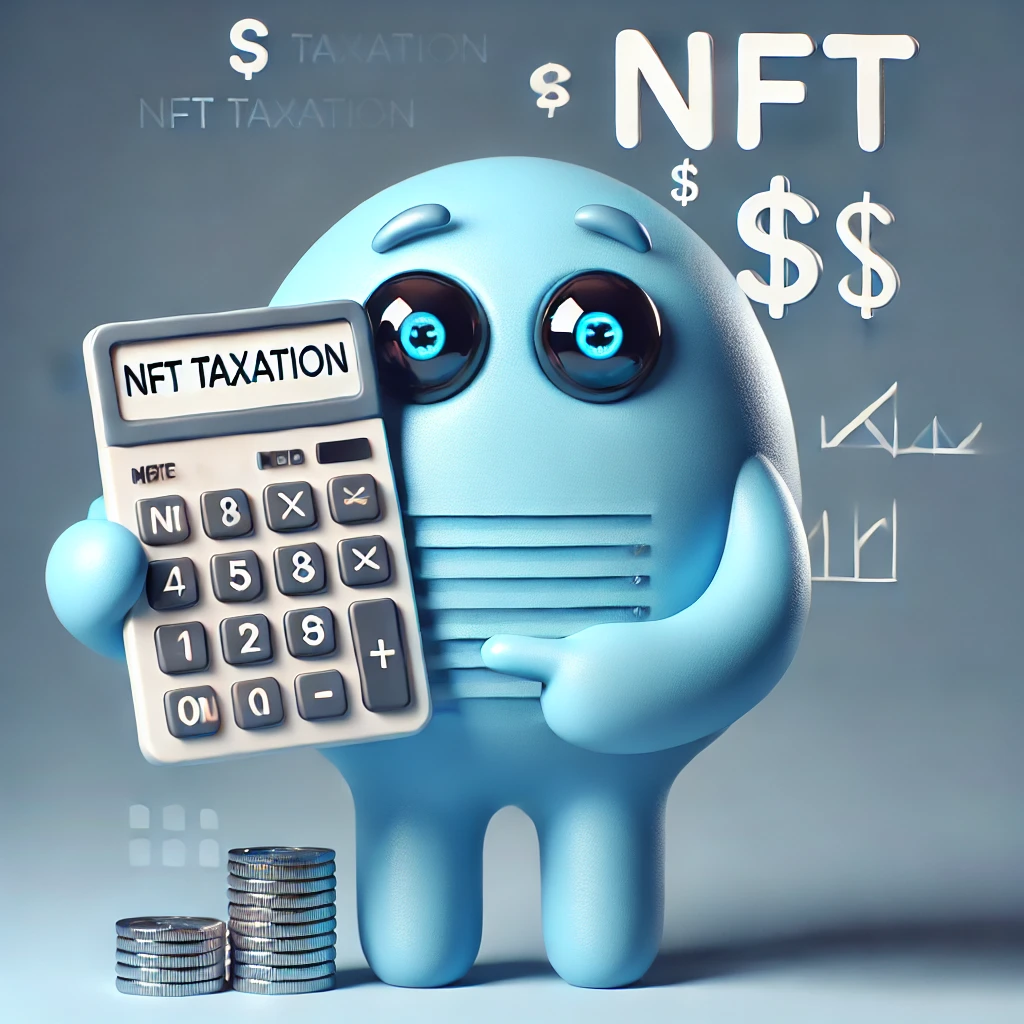The world of NFTs (non-fungible tokens) has exploded in popularity, bringing with it a wave of excitement, investment, and, inevitably, tax implications. Unlike traditional assets, NFTs introduce unique challenges for tax authorities and individuals alike, demanding a nuanced understanding of how these digital collectibles fit within existing frameworks. This article delves into the complexities of NFT taxation, shedding light on the different types of transactions, relevant tax laws, and the strategies for navigating this evolving landscape.
Table of Contents:
- Understanding the Basics: What are NFTs and How are They Taxed?
- Navigating the Tax Landscape: Key Considerations for Investors
- Strategies for Effective NFT Tax Optimization
- The Future of NFT Taxation: An Evolving Landscape
- Conclusion: Embracing a New Era of Tax Optimization
- FAQ: Addressing the Commonly Asked Questions
Understanding the Basics: What are NFTs and How are They Taxed?
At their core, NFTs represent a digital record of ownership over a unique asset, often linked to digital content like artwork, music, or even virtual real estate. Their ownership is tracked on a decentralized ledger known as a blockchain, ensuring its immutability and authenticity. The tax treatment of NFTs hinges on how they’re acquired, sold, traded, or used, with different scenarios triggering varying tax implications.
The Taxable Events in the NFT Ecosystem
The taxability of NFTs often depends on how they are used. Here’s a breakdown of different scenarios and their associated tax implications:
1. Buying and Selling NFTs: Capital Gains and Losses
The most common NFT transaction involves buying and selling. In this scenario, the profit realized from selling an NFT is typically considered a capital gain, subject to capital gains tax. Similarly, a loss incurred upon selling an NFT is treated as a capital loss, potentially offsetting other capital gains.
The capital gains tax rate varies based on your holding period and income level. Short-term capital gains, realized from holding an NFT for less than a year, are taxed at your ordinary income tax rate. Long-term capital gains, from holding an NFT for a year or more, are taxed at more favorable rates, ranging from 0% to 20%. However, the exact rates vary depending on the investor’s income bracket.
2. Using NFTs for Revenue Generation: Business Income
NFTs can also be an avenue for generating income through multiple avenues. When NFTs are used for commercial purposes, like licensing intellectual property, or even selling access to exclusive content, the income derived from these activities is typically treated as business income subject to ordinary income tax rates. This is different from capital gains because the revenue is generated through active participation in a business activity.
3. Trading NFTs: Income is Often Considered Capital Gains
The treatment of NFTs traded for other digital assets, like cryptocurrencies, can be complex and depends on the specific circumstances. In some cases, the IRS might consider such trades as taxable events, treating the profit as a capital gain. However, there is no official guidance on trading NFTs for other cryptocurrencies, and the taxability of such transactions is still a gray area.
4. Receiving NFTs as Gifts or Donations: Tax Implications
Gifting or donating an NFT triggers tax implications for both the giver and the recipient. The giver might be subject to gift tax if the value of the NFT exceeds the annual exclusion limit. The recipient, upon receiving the NFT, may need to report it as income depending on its value and the nature of the gift. Donations of NFTs are also subject to specific tax considerations, which depend on the recipient charity and the NFT’s value.
Navigating the Tax Landscape: Key Considerations for Investors
The tax implications of NFT transactions can be intricate, requiring careful consideration of various factors. Here’s a breakdown of key considerations for navigating the NFT tax landscape:
1. Reporting NFT Transactions: Documentation is Key
Accurate recordkeeping is crucial for NFT taxation. You need meticulously documented information on each NFT transaction, including:
- Date of acquisition and disposal
- Purchase price or cost basis
- Sale price
- Any associated fees or expenses
- Proof of ownership through wallet addresses and transaction IDs
This documentation will help you determine your capital gains or losses and facilitate IRS reporting, minimizing potential audit risks.
2. Cost Basis Determination: Calculating Gains and Losses
The cost basis is the starting point for calculating your capital gains or losses. It represents the total cost of acquiring an NFT, including the purchase price plus any associated expenses, such as gas fees, marketplace fees, and any other costs incurred to acquire the NFT.
Understanding your cost basis is critical for determining the profit or loss realized upon sale. The IRS recommends using the “first-in, first-out” (FIFO) method for calculating gains and losses, but other methods may be beneficial depending on your unique circumstances.
3. Tax Treatment of NFT Royalties: Income or Capital Gain?
Many NFTs incorporate royalties, which are recurring payments earned by the creator every time their NFT is resold. The tax treatment of royalties can be complex and falls under different categories:
- If you are the creator of the NFT: Royalties are treated as business income and are subject to ordinary income tax rates.
- If you are not the creator but receive royalties: The tax treatment depends on the nature of your involvement. If you actively manage the resale of the NFT and receive royalties as part of a business, it will be considered business income. However, if you simply own the NFT and passively receive royalties, the tax implications are less clear. There is no definitive guidance from the IRS regarding royalties for passive NFT owners.
4. Tax Implications of NFT-Based Utility: Going Beyond the Traditional
NFTs offer utility beyond mere ownership, unlocking unique possibilities and tax considerations. NFTs can grant access to exclusive online communities, virtual events, or real-world benefits. The tax treatment of these benefits can depend on the specific nature of the utility:
- If the utility directly generates income: For example, access to a membership service that earns you money, the income is likely treated as business income and taxed accordingly.
- If the utility offers non-financial benefits: Benefits like accessing private events, exclusive content, or discounts may not be directly taxable. However, it’s essential to consult with a tax professional for specific guidance.
5. NFT Staking and Lending: Understanding the Tax Treatment
NFT staking and lending are increasingly popular activities in the NFT ecosystem, but their tax implications are still evolving. Here’s a quick overview:
- NFT Staking: When you stake your NFT, you’re essentially locking it in a smart contract to earn rewards in the form of cryptocurrency or other tokens. These rewards are typically considered taxable income, and you’ll need to report them on your tax return.
- NFT Lending: If you lend out your NFT, the income generated from the loan is typically treated as taxable interest income. This could be in the form of fees or other forms of compensation for lending the NFT.
Strategies for Effective NFT Tax Optimization
While NFT taxation can seem daunting, proactive strategies can help you optimize your tax obligations and minimize potential liabilities:
1. Consulting a Tax Professional: Gaining Expert Guidance
Navigating the complexities of NFT taxation is best done with professional support. A qualified tax advisor specializing in cryptocurrency and digital assets can provide personalized advice, tailored to your specific circumstances. They can assist with:
- Understanding the tax implications of your NFT transactions
- Developing strategies for minimizing your tax burden
- Compiling accurate and comprehensive tax documentation
- Ensuring compliance with all relevant tax regulations
2. Maintaining Accurate Records: The Foundation of Tax Compliance
Detailed recordkeeping is crucial for accurate reporting and potential audit defense. Ensure you meticulously record all your NFT transactions, including:
- Date of purchase and sale
- Purchase price or cost basis
- Selling price
- Associated fees and expenses
- Proof of ownership (wallet addresses, transaction IDs)
Maintaining this documentation will streamline your tax reporting, prevent any discrepancies, and ensure accurate calculation of your tax liabilities.
3. Exploring Tax-Loss Harvesting: Minimizing Capital Gains
Tax-loss harvesting is a strategy that involves selling losing investments to offset capital gains. In the context of NFTs, if you’ve incurred losses on some NFT holdings, selling them can help offset any capital gains realized from the sale of profitable NFTs. This strategy can reduce your overall tax burden by offsetting gains with losses.
It’s important to remember that tax-loss harvesting should be done strategically. You should consider the potential for future price appreciation of the NFT before selling, and it’s best to consult with a tax professional to ensure you’re taking full advantage of this strategy while remaining compliant with the IRS.
4. Leveraging Tax Deferral Strategies: Managing Taxable Events
Tax deferral strategies aim to delay the realization of taxable events, effectively postponing tax liabilities without avoiding them altogether. In the NFT realm, these strategies might involve:
- Donating NFTs to Charity: Gifting NFTs to qualified charities could potentially offer tax deductions, depending on the fair market value of the NFT and the donor’s income.
- Holding NFTs for Long-Term Gains: Holding NFTs for more than a year can qualify you for the lower long-term capital gains tax rates, deferring your tax obligation.
It’s important to note that tax deferral strategies are subject to specific rules and regulations. Consulting with a tax professional is crucial to ensure you fully understand the implications and requirements of these strategies.
The Future of NFT Taxation: An Evolving Landscape
The metaverse and NFT landscape are continuously evolving, and so is the regulatory landscape. As NFTs become increasingly integrated into our financial lives, tax authorities are constantly adapting their rules to keep pace with these transformations. However, the specific tax implications continue to be a subject of ongoing debate and lack of clarity.
1. Regulatory Uncertanity: Navigating the Evolving Landscape
The IRS is actively seeking guidance on how to appropriately classify and tax NFTs. The current regulations are still relatively new, and specific guidance on certain aspects of NFT taxation is lacking, leading to uncertainty for investors. This uncertainty can make it challenging to accurately determine your tax liability and navigate the complexities of reporting your NFT transactions.
2. International Tax Harmonization: A Global Effort
Global tax harmonization is becoming increasingly crucial as NFT transactions occur across borders. Governments around the world are collaborating to develop unified approaches to taxing digital assets, ensuring fairness and consistency across jurisdictions. This is an ongoing effort, and clear guidelines are expected to emerge over time.
3. Tax Planning for the Long Term: Investing in Understanding
As NFTs continue to gain prominence, it’s more important than ever for investors to prioritize tax planning and seek expert guidance. Understanding the latest developments in NFT taxation and proactively managing your tax obligations will be key for navigating the evolving landscape and maximizing your investment returns.
Conclusion: Embracing a New Era of Tax Optimization
NFT taxation is a constantly evolving field, presenting both opportunities and challenges. While the current regulatory landscape may seem uncertain, investors can navigate this terrain successfully by adopting a proactive approach. Diligent recordkeeping, expert guidance, and an understanding of the key concepts are essential for minimizing tax liabilities and maximizing investment returns. As the NFT ecosystem continues to mature, staying informed about tax updates and seeking tailored advice will be key to staying ahead of the curve and capitalizing on the exciting possibilities within this transformative industry.
FAQ: Addressing the Commonly Asked Questions
Q: What are the most common NFT tax mistakes?
Some common mistakes include failing to track and report all NFT transactions, miscalculating cost basis, not understanding the tax treatment of royalties or utility, and using the wrong tax forms or methods for reporting.
Q: Do I need to pay taxes on NFTs I receive as gifts?
If the fair market value of the NFT exceeds the annual gift tax exclusion limit, the giver may be subject to gift tax. You, as the receiver, may also need to report it as income based on its value and the nature of the gift.
Q: How do I report NFT transactions on my tax return?
The IRS currently lacks specific guidance on NFT tax reporting. You may need to use Form 8949 and Schedule D for capital gains and losses, but consulting with a tax professional is highly recommended to ensure compliance with the latest regulations.
Q: Are NFTs taxed differently than other digital assets like cryptocurrencies?
While there are similarities in their tax treatment, there are also key distinctions. The tax implications of NFTs depend on how they are used, while cryptocurrencies are primarily taxed based on their nature as digital assets. The IRS has not yet released specific guidelines on the tax treatment of NFTs, leading to some complexity in their classification.
Q: What is the future of NFT taxation?
The future of NFT taxation is likely to involve greater clarity and guidance from tax authorities worldwide. As NFTs become more integrated into daily life, regulations will evolve to ensure consistent and fair taxation across jurisdictions. This will require ongoing engagement with tax professionals to ensure you stay informed and compliant with the latest developments.






